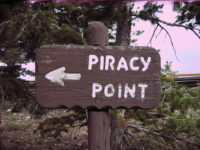The CBC decision to sue the Conservative Party for copyright infringement over seven clips that were either used in a campaign ad or posted to Twitter has unsurprisingly garnered considerable attention. While the CBC claims that its lawsuit was designed to defend perceptions of independence of its journalists and journalism, the opposite has predictably occurred with many believing that the lawsuit itself (filed eleven days before the election after the content was removed) demonstrates bias against the Conservative party. Not only does the lawsuit fuel perceptions of bias, but it causes enormous damage to CBC journalists – Rosemary Barton and John Paul Tasker – who are both named as plaintiffs in the lawsuit. The CBC now says it will file an application to remove them from the suit, but it is hard to understand how anyone at the public broadcaster thought it was a good idea to have one of its lead news anchors and a parliamentary reporter sue a political party.

Fair Dealing by Giulia Forsythe (CC BY-NC-SA 2.0) https://flic.kr/p/dRkXwP
Copyright
CBC Sues the Conservative Party of Canada for Copyright Infringement Citing Campaign Video, Posting Debate Excerpts on Twitter
The CBC has filed a copyright infringement lawsuit against the Conservative Party over the use of clips on its Not As Advertised website and the use of debate clips on its Twitter feed. The lawsuit, filed yesterday in federal court, claims that a campaign video titled “Look at What We’ve Done” contained multiple excerpts from CBC programming in violation of copyright law. Moreover, the CBC also cites tweets that included short video clips of between 21 seconds and 42 seconds from the English-language leaders’ debate. The CBC argues that posting those clips on Twitter also constitutes copyright infringement.
“A Broad and Liberal Interpretation”: The Supreme Court of Canada Expands Copyright Users’ Rights
The Supreme Court of Canada today released its decision in Keatley Surveying v. Teranet, a case that involves the application of the Copyright Act’s crown copyright provision to land surveys registered or deposited in provincial land survey offices. The Government of Ontario argued that crown copyright applies to the surveys. The surveyors argued that it did not and were seeking compensation for their inclusion in a database service run by Teranet under licence from the province. The court ruled in favour of the province, concluding that the surveys are covered by current crown copyright provision.
I’ll address the challenges with that decision in an upcoming post, though it is clear that the majority decision written by Justice Abella is open to legislative reform:
The Law Bytes Podcast, Season One in Review: The Copyright Episodes
Copyright law and policy was an important part of season one of the Law Bytes podcast with several episodes devoted to Canadian reforms as well as international developments. The Canadian copyright review figured prominently: Episode 4 featured clips from my appearance before the Standing Committee on Industry, Science and Technology including exchanges with MPs, a later episode contained my lecture on what the Canadian experience teaches about the future of copyright reform, and Carys Craig came on the podcast to discuss the Industry committee copyright review report.
The LawBytes Podcast, Episode 23: The WIPO BRIP Database – Rick Shera on the MEGA Experience and the Dangers of False IP Claims
The last episode of Season One of the Lawbytes podcast (new episodes will resume in September) returns to WIPO, the World Intellectual Property Organization and its proposed BRIP database. The BRIP database, which stands for Building Respect for Intellectual Property, will be a database of allegedly infringing websites. While some of the details remain sketchy, the basics are that BRIP will be a database of allegedly infringing websites that could be used by advertisers to stop advertising on those sites, payment providers to stop service, or even site blocking initiatives to mandate ISP blocking. Yet the BRIP database currently envisions the possibility of lobby groups such as the movie and music associations inserting sites in the database with no oversight, no review, and not even any transparent standards.
That approach caught the attention of Rick Shera, a lawyer in New Zealand with Lowndes Jordan and one of that country’s leading IP and Internet law experts. Rick posted a Twitter stream on the risks associated with false IP accusations, speaking from the experience of one of his clients. He joins me on the podcast this week to discuss the experience of MEGA and the risks of false IP claims.











